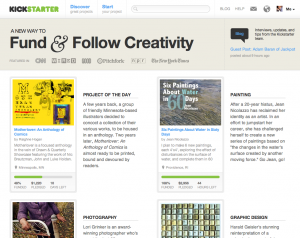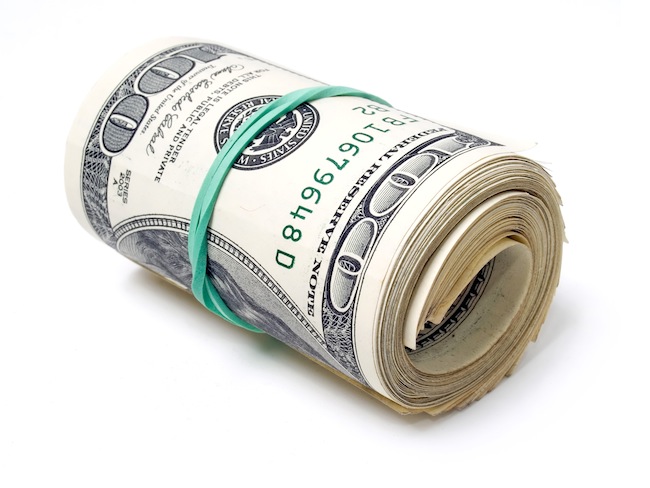
One question people never ask themselves that could drastically change their lives is: 'What is Money?' Once you figure out what money is, and what it represents, making it is far simpler. That doesn't mean it's easy. But it does clarify the challenge considerably. Image © Thinkstock
Yesterday, I explained how most of the people in the Occupy Wall Street protest haven’t yet realized the struggle isn’t between the rich and the poor – it is between the knowledge workers and manual workers, which Peter Drucker predicted in startling detail decades ago. Charles Hughes, a professor at Henderson State University, had reservations, saying:
The problem with this analysis is that it privileges only one set of skills: how to turn a buck. The young MBAs who delve into marketing, banking, and international economics and discovers the paths to power and the locations of the money spigots and devote their lives to amassing wealth like Scrooge McDuck are the ones considered successful.
He goes on to talk about how people like Steve Jobs should be glorified and how the liberal arts are not appreciated sufficiently.
[mainbodyad]In many of his points, I agree wholeheartedly. Emphatically, even. But I don’t agree that only one set of skills is valued in society – the MBA set – because I think to assert this requires operating from an incorrect premise that misunderstands the very nature of what money is. I think such a belief is driven by the “spotlight” fallacy mental model and causes people make the incorrect assumption that the top 1% consists solely of people like hedge fund managers, speculators, or Ivy League MBA’s freshly minted with trust funds and lessons in how to shut down factories. That’s not what the data shows. Those people do exist but they are the minority, garnering a disproportionate share of the headlines and news copy because the stories are infuriating and filled with drama, fights, struggles, and class warfare.
But this is a minor point because, again, I agree with most of his assertions and statements. Still, I saw the comment during lunch and I thought it might be a fantastic opportunity to educate a lot of people about the very nature of money, individual freedom, and choice. Before I could help it, it had turned into a 4,000+ word essay. I’m publishing it as a stand-alone article. You might want to scroll to the bottom of the page and click the “Print Friendly” button if you would find it easier to navigate such a long essay on paper rather than a computer screen.
The Fundamental Rule of Economics
To understand this response, you need to know what I personally took to calling the fundamental rule of economics. Here it is.
In a free and just society, if a man wants something, he must either create it himself or exchange with other people for something they desire or need.
For example, if he wanted a chicken to feed his family, he could either raise the chicken himself or trade someone for a chicken. In order to trade, he must have something of value; a good or service that another person finds valuable enough to desire. If the man is a skilled craftsman, he could offer to make a kitchen table. If the man is a skilled baker, he could offer apple pies. If the man is a lawyer, he could offer legal service. By exchanging one thing for another, the barter system rose.
There were two major problems with the barter system.
- First, it exposed everyone to counterparty risk. It turned every man into a bank. If you delivered a table for the promise of a chicken, yet the chicken farmer died, you were out a chicken unless you could “foreclose” on his chicken coup and take what was owed to you following his death. If he fell on hard times, you had to pursue him to collect your debt. This made long-term planning nearly impossible because you might desire to trade your product or service in the spring for something that was required in the winter.
- Second, the barter system made it impossible for all people to interact with all others. Instead, they were forced to create elaborate networks to ensure everyone got what he or she needed. If you want to trade for wool but the sheep herder doesn’t need your wheat and instead wants pork, you would have to find someone who wanted to trade a pig for grain so you could then return to the sheep herder and close the deal.
In response, our ancestors began using symbols and tokens to represent future claim checks on society. We called these symbols “money”. Some cultures used shark teeth, while others minted their own coins.

Our ancestors began to use an interchangeable system of symbols to represent claim checks on society. We call these tokens 'money'. Image © iStockphoto/Thinkstock
As long as the currency remained stable relative to the population, people could accept the token and know they would be able to redeem it for their own family’s needs at some point in the future. Unlike the barter system, you could have approached the sheep herder and used money from past sales of wheat to buy wool today.
This solved both the counterparty risk and the need to form complex transactions, greatly improving life so long as the society didn’t try to cheat by increasing the money supply. It opened up the world and civilization flourished because you didn’t need to know who you were doing business with as long as the currency he used was good, meaning more people interacted and trust was spread throughout the system rather than staying in insular communities. This is partly the reason ancient port towns and trading hubs were the pinnacle of advanced civilization, art, culture, and scientific achievement. When goods and ideas flow more freely, the result is better for mankind.
Switching from Barter to Money Didn’t Change the Fundamental Rule of Economics
This is the important point: Just because we switched from barter to symbols called money doesn’t change the basic truth that if you want something, you must either create it yourself or exchange with other people, providing them with a good or service that they desire or need.
The implication of that fundamental economic fact, which is really just a way of saying “what humans do and how humans behave”, is that every dollar spent in society represents a “vote”. A few moments ago, I enjoyed a bottle of Coca-Cola. In essence, I voted for two things:
 I voted for the business that sold me the bottle, a local convenience store, despite the higher price of $1.50 because the 50¢ savings I could have achieved by going to a more distant discount retailer wasn’t worth the time and gas it would have taken for me to travel there.
I voted for the business that sold me the bottle, a local convenience store, despite the higher price of $1.50 because the 50¢ savings I could have achieved by going to a more distant discount retailer wasn’t worth the time and gas it would have taken for me to travel there. - I voted for The Coca-Cola Company because the refreshment and enjoyment I received from the soda was worth the money. Had the convenience store not had Coke, I would have gone elsewhere.
If Coca-Cola provides more value to me and billions of other citizens than Acme Soda does, it would amass an enormous fortune and command significant resources. That is good. That is just. That is right because Coke is providing more value to more people.
Our Society Isn’t Perfect, But We Get Better With the Passing Years
The corollary is that in a perfectly designed fair and just society, the wealth one accumulates would represent total sum surplus value provided to civilization. However, we do not live in a perfect society. But it is pretty damn close. Though abuse and immorality exists – e.g., the defense contractor that bribes a politician to get a kickback for a lucrative contract with taxpayer money – the American system overall gets it right 80% to 90% of the time so that the sin and folly crowd represent a minority of the capital accumulation.
On a side note, this is the reason I support:
- Excessively low taxes in most areas of life except in the case of an estate tax, which I think should be significant on fortunes of certain sizes because money should not be concentrated in the hands of those who didn’t earn it. That sort of resource allocation has a terrible historical record. That is, I think we should celebrate people like Bill Gates and Steve Jobs having billions upon billions of dollars. I think we should recoil at the idea of their great-grandchildren having that level of unearned wealth.
- Bringing back the usury laws that were repealed in the 1980’s limiting the maximum interest rate to a multiple above prime; the current system distorts the fundamental rule of economics.
- Wise, rational regulation in food, environmental, water, trade, anti-trust, and energy matters.
- Term limits for all publicly elected offices
- A ban on corporate person-hood
- The reinstatement of bankruptcy laws that allow student debt loan to be discharged. I consider the change in bankruptcy code that protected this class of debt as one of the most evil assaults on the middle class in the past 50 years.
It all goes back to creating a fair and just society. The government’s job is to act as a check and balance of power that offsets occasional abuses from other sectors of humanity.
The Fundamental Rule of Economics and the Value Placed Upon Liberal Arts
The implication of the fundamental rule of economics can be stated as follows:
How, and where, money accumulates throughout a free civilization represents what the people value most.
Sometimes, that isn’t good for the future of mankind. As Jon Stewart famously said, “there is a market for hookers and cocaine”. That doesn’t change the accuracy of the general rule. It holds true, as long as you account for certain economic models that include people who make very small amounts of scalable income on a per capita basis that aggregates into large total compensation. This leads to two core, basic, foundational beliefs:
1.) A man should be free to determine how his own money and time is allocated.
2.) Anything that I desire or need in life depends upon me getting it by providing value to society. It is not the job of an employer to “provide” a job. It is not the job of the government to force people to give me their claim checks through artificially influencing Congress or budgetary processes. It is not my family, friends’, parents’, or society’s fault if I do not have the things I desire. It is my fault because I’m not providing enough value to my fellow man commensurate with the cost of providing that value.
In my case, I went to school to study classical music on a vocal performance scholarship because I wanted to be a well-rounded person exposed to history, ethics, philosophy, religion, literature, and culture. Those were good for me and good for my soul. Right now, as I write this essay, I am listening to Vivaldi’s Magnificat in G Minor, first movement, and there is no doubt that four years of intense music theory and performance experience allow me to have a much richer appreciation for the complexity of what is happening in the work. This was valuable enough to me that I agreed to borrow a significant amount of money for future repayment; money that went to the professors and educators who spent their time and relied upon their experience to instruct me in this field. Again, I was voting with my dollars.
No Matter How Much I Love My Cause, It Does Not Give Me the Right To Infringe Upon the Rights of Others
But that is the key. That is the core. That is the overarching truth that is inviolate. I chose to give up future claim checks on society for that knowledge. Therefore, if there are not sufficient people making that same allocation decision, in a free society, the institution of classical music at which I studied should not survive because the only alternative is to force other humans to give up their resources, for which they worked and earned, to meet my consumption demands. Such blatant disregard for the freedom of others is the heart of immorality. It is theft. It is the very definition of sin.
We can talk about how music “lifts the human spirit” or “contributes the civilization” all we want. But unless people are cashing in the claim checks they received for value given to society in sufficient numbers to make the institution self-sustaining, it isn’t true. That leaves us with the alternative of forcing people to give up those same claim checks by compulsion.
In other words, I pay hundreds of dollars for symphony tickets to very good orchestras because 1.) I like cashing in some of the value I’ve created for society to “vote” for great musicians and artists, and 2.) there are not enough people relative to supply of seats to bring the cost down to more reasonable levels. I do not have a right to force the baker down the street or the school teacher in my hometown to subsidize my consumption desires because it must, by definition, come at the expense of their own needs and wants.
That does not mean that the arts should fail. Far from it! In fact, the biggest grant issued by the Kennon & Green Foundation this year was to an institution devoted to the liberal arts! The gift was several magnitudes larger than any other. That is because I value the liberal arts, and classical music, specifically. But again, it is my choice. I am acting as a free agent. I am only voting with what I earned. I am not forcing others to live by my rules and support my causes by depriving them of their own capital. I can try to persuade them to support causes that matter to me, such as the arts, but I cannot force them to do so.
The Knowledge Economy Will Benefit Those Liberal Arts Students Who Produce Great Content, Services, and Products
That is the theory behind new services like Kickstarter.com, which has already raised $100 million in cash for projects that people post on the site. Sometimes, these projects are varied and allow artists and content creators to pre-sell works without taking financial risks of their own, from “60 paintings about water in 60 days” to developing a web television series.

Services such as Kickstarter make it possible for people to convert their ideas into businesses. This means the most successful liberal arts principles, properly applied, are going to result in drastic wealth disparities because a brilliant, talented 14 year old might be making $100,000 from his or her bedroom, while the parents downstairs are on welfare. It's the nature of the new knowledge economy.
In this knowledge-based economy, the best, most talented in the field are going to rise to the top and take most of the income. A great project idea might get $50,000, like a solar system video game proposal I just browsed. A terrible idea will get zero. Nothing. Zip.
I celebrate this outcome because if you can’t convince people to give you money based on your work – that is, if you can’t provide them enough utility they want to trade with you – you need to find a different profession or, alternatively, learn to live with the income you have and stop complaining despite how difficult life is. Neither is a wrong choice. It is all about maximization of aggregate happiness. Following your bliss does not entitle someone to whine about the eternal presence of opportunity cost.
More bluntly: The old ethos of “work hard, and you’ll be rewarded for showing up and years of service” is dead. Instead, all of society’s rewards will flow to the best creators of content, products, and services, regardless of age, race, political affiliation, sexual orientation, religion, gender, or location. It’s going to be a fantastic frontier of progress if you are talented. If you are below average, which a significant minority of the population must be by definition, it is going to create a permanent underclass.
The 4 Lessons We Should Take Away from the Role of Money and the Liberal Arts
There are four takeaways from this:
- 1.) If an organization or individual is not financially self-sufficient it means that by definition he or she is not providing as much value from society has he or she is taken from it. E.g., If someone borrows $100,000 to attend art school, yet can’t create art sufficiently valued by society to generate enough sales to repay the debt, the net effect has been a negative on civilization. People only pay for what they find valuable and what gives them utility. There are a handful of exceptions to this rule that still fit within the economic model and are consistent with our principles but would require essays of their own (e.g., foster service in impoverished neighborhoods or free immunization for children of poor families).
- 2.) How people spend their money and time reveals their true priorities. Becoming upset about someone else’s allocation decisions is foolish and irrational. I don’t expect people to understand why I’d rather spend money on tickets to Baroque harpsichord concerts than NFL games. The fact that society doesn’t “value” my tastes and preferences doesn’t mean I should be able to force everyone else to live by my standards or desires.
- 3.) The liberal arts are valuable but you cannot survive, and should not be able to survive, on knowledge alone until you convert that knowledge into useable products and services that people want of their own free will. Let’s call this the “Steve Jobs” principle. Steve studied humanities and arts, calligraphy and philosophy. That was important for his personal enrichment. But it did not translate into a good living until he converted it into good for his fellow man. It is good and just that he had $7 or $8 billion. There is a lot of virtue in a system where such an outcome is possible. Unfortunately, some people are mentally wired in a way that if you point out the truth of their situation – that other people don’t value the products or services they are offering at the prices they demand – they translate it into “other people don’t value me“. They are not the same thing.
- 4.) Money does not equal holiness. To believe it does is to suffer from a particular American pathology. Instead, money equals past utility provided to civilization. Even if you believe the Koch Brothers are horrible people and have terrible priorities, the only reason they have their capital is because they have provided far more net value to society than others on a relative basis. Now, in the case of the Koch Brothers, if the reports of them breaking the law to secretly sell things to Iran, a terror-sponsoring nation, prove true, then they would fall into the exception of non-virtuous wealth and, in my opinion, should be sent to Federal prison. Law enforcement will sort that out sooner or later. That doesn’t change our general rule: People buy Angel Soft toilet paper and Quilted Northern toilet paper. People buy Dixie cups. People buy Sparkle paper towels. People buy Georgia-Pacific paper. People want nitrogen fertilizer for their farms to make food grow. The Koch Brothers sell these items. People value what they are selling so they exchange their money for the products. That is the source of the Koch Brothers’ claim checks on society. Toilet paper may not be glamorous but it provides more human utility than many art students trying to make a living selling paintings. On the other hand, some artists and musicians provide much more utility to society so they collect even more claim checks. The artists at Pixar created classics such as Finding Nemo and Toy Story. They transported people to new worlds and became staples in the lives of children everywhere. As a result, Pixar is worth more than Angel Soft and Quilted Northern. It is all about utility.
The Role of Government Is to Provide a Level Playing Field, But Not Equal Outcomes
In other words, you are seeing the Koch Brothers. I am seeing the toilet paper. It is the toilet paper that is providing utility and building civilization. As long as they continue to provide toilet paper to so many people on such an inexpensive basis, they deserve to have more money than a somewhat talented singer in a small town.

Koch Industries owns the companies that provide goods such as Dixie cups, Angel Soft toilet paper, Quilted Northern toilet paper, coffee lids, copy paper, etc. Most American homes buy the products the firm offers through its subsidiaries.
Why? More humans get utility from toilet paper than they would out of hearing our mediocre singer due to a biological hierarchy of needs. (And I say that as a classically trained musician who gives far more to music causes than he spends on toilet paper.) That is how a fair and just society should operate. Likewise, as long as more people identify with Britney Spears than they do with Renee Fleming, the former is going to earn more money than the latter. It goes back to utility; giving people what they want in a free exchange.
That is an important point. It is a vital point. Somehow, this American obsession with mammon as a god has led to people immediately equating wealth or a high income with righteousness or someone you’d be proud to have your child marry. A good man and a wicked man can both plant an apple seed and it is going to grow into an apple tree, providing fruit. A drug addicted, selfish, emotionally unstable musician might sell just as many albums as one who is a saint and feeds homeless people. You can be a terrible man who beats his children and throws puppies off overpasses and if you provide society more net value than your neighbors, you are going to generate more money. It is because money represents claim checks and votes. It does not represent goodness.
The best products and services on the whole win as long as the government is doing it’s job. In fact, I think aside from defense, one of the most important tasks “the people” have is maintaining a level playing field in consumer markets. Otherwise, the relationship between money and value breaks down whenever you get into totalitarian systems, such as Stalin’s Russia or Hugo Chavez’s Venezuela as well as in a corrupted form of capitalism called Crony Capitalism in which wealth flows as a result of kickbacks and bribes.
[mainbodyad]It may seem like the United States is suffering from the latter now but to assert that shows a remarkable lack of knowledge of this country’s history. We are far better than we have at any time in the past. That doesn’t mean we can’t get even better. Things such as protecting Net Neutrality from monopoly-like telecommunication companies is vital if we want our republic and economy to thrive.
How This Ties Into the Occupy Wall Street Movement
That is the reason when someone says, “The system only rewards a guy who can make a buck”, I hear, “The system just rewards a guy who can provide utility and value for other people in free exchanges without external coercion”. It is because of my liberal arts education I came to the same conclusion as the economists. It was that very liberal arts education that allows me to analyze and study the system, drawing my own conclusions. That knowledge alone isn’t what made me rich. It was the ability to convert those observations into tangible products and services that people desire. It was the Steve Jobs principle.
But getting back to our Occupy Wall Street discussion, you have the good, rational, wise people on one side arguing that money in politics is dismantling our system of freedom and working toward election reform so this can’t happen in the future. This is advisable policy. I hope they win. The fact that Congress still hasn’t passed a 50% payroll tax cut for everyone in the nation is proof that the corporate lobbyists are winning.
However, that is not the majority of men and women representing themselves on the We Are the 99 Percent blog. That site consists almost entirely of the bottom 20% of society; displaced manual workers who don’t realize they are fighting the wrong battle or misguided young people who borrowed large sums of money they couldn’t afford to repay to get degrees in subjects that might themselves be valuable but that they lack the talent or skill to convert into utility for civilization. That war, I maintain and reassert, is not between the rich and the poor. It is between the knowledge worker and the manual worker. The latter just doesn’t know it, yet. Until they realize it, they will live in squalor and poverty amidst some of the greatest affluence and wealth in the history of humanity. It doesn’t have to be that way.



